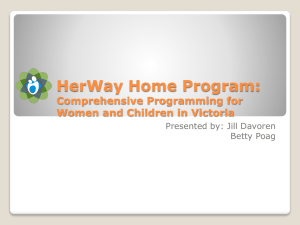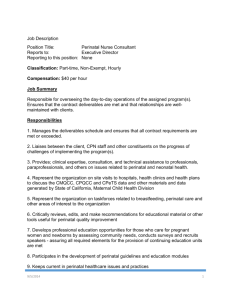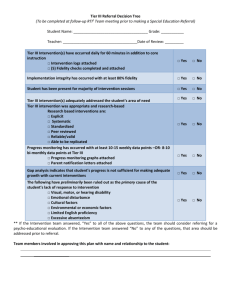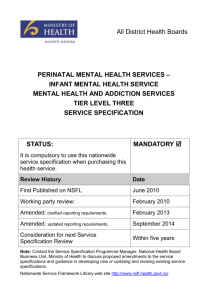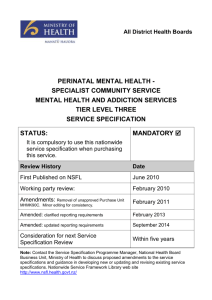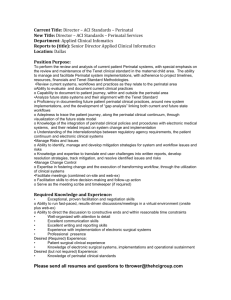Perinatal Mental Health Services - Nationwide Service Framework
advertisement
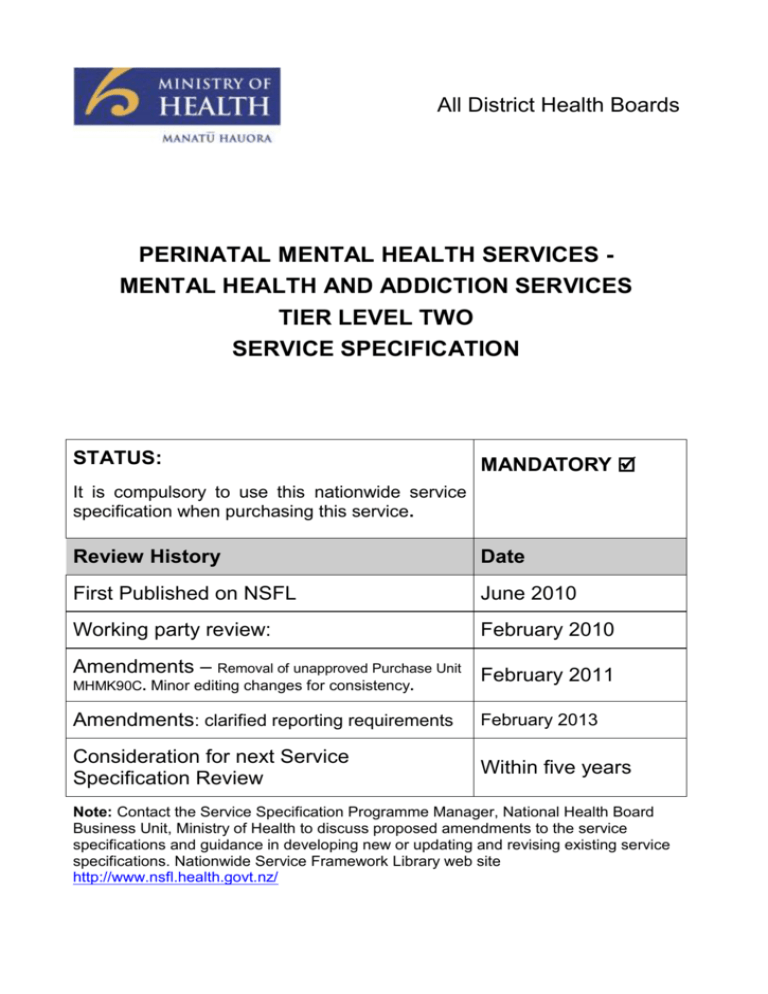
All District Health Boards PERINATAL MENTAL HEALTH SERVICES MENTAL HEALTH AND ADDICTION SERVICES TIER LEVEL TWO SERVICE SPECIFICATION STATUS: MANDATORY It is compulsory to use this nationwide service specification when purchasing this service. Review History Date First Published on NSFL June 2010 Working party review: February 2010 Amendments – Removal of unapproved Purchase Unit February 2011 MHMK90C. Minor editing changes for consistency. Amendments: clarified reporting requirements February 2013 Consideration for next Service Specification Review Within five years Note: Contact the Service Specification Programme Manager, National Health Board Business Unit, Ministry of Health to discuss proposed amendments to the service specifications and guidance in developing new or updating and revising existing service specifications. Nationwide Service Framework Library web site http://www.nsfl.health.govt.nz/ PERINATAL MENTAL HEALTH SERVICES MENTAL HEALTH AND ADDICTION SERVICES TIER LEVEL TWO SERVICE SPECIFICATION This tier two service specification for Perinatal* Mental Health Services (the Service) must be used in conjunction with the tier one Mental Health and Addiction Services service specification and one of a range of tier three Perinatal Mental Health service specifications. The service specification defines Perinatal mental health services and their objectives in the delivery of services. The effect of perinatal mental illness has the potential for rapid deterioration and high associated risk on the mother’s relationship to their infant. This suggests the need for an urgent / immediate response for mothers with a history of bi-polar affective disorder or a psychotic disorder. Mental health problems in either the parent or infant will often manifest in behavioural or relationship difficulties and therefore this could be the identifying issue. Specialist services like Perinatal Mental Health may be delivered using a hub and spoke model. The ‘hub and spoke’ model has been adapted to health service provision to facilitate clinical support by specialist clinicians in large regional centres (hubs) to clinicians in generic secondary services in smaller provincial centres (spokes). The model involves the establishment of formal and informal relationships between each hub and its associated spokes, with regular structured supervision and training combined with ad hoc consultation and liaison support on an as required basis. The hub and spoke model is most effective when an individual in the spoke service has a dedicated coordination role, often in conjunction with a local ‘virtual team’ (including in some cases primary care clinicians). 1. Service Definition The Service covers pregnancy and the first postnatal year. This focus allows for greater recognition of the profound effects that parental mental illness can have on the foetus, infant and toddler. The Service will provide specialised perinatal mental health assessment, management and treatment that will include but is not limited to: engagement of the mother, infant and family recognising the importance of keeping the mother and infant(s) together specialist assessment (including risk assessment, and cultural assessment where appropriate), diagnosis, and intervention with specific attention to the mother infant relationship, and the parents and all the children in the family assessment of the mental health of the infant and provision of interventions or referral needed to address any problems identified assessment of family functioning and the impact of this on the mother-infant relationship cultural supports as identified in the cultural assessment * The term Perinatal services has international recognition as the accepted term for Services that provide for mothers of infants under one and women during pregnancy. Perinatal Mental Health Services - Mental Health and Addiction Services tier two service specification March 2013 Nationwide Service Framework 2 accessibility and appropriateness for people of all cultures including Maori and Pacific families, whānau and fono provision of specialist use of medication provision of other specialist treatments in accordance with comprehensive management plans ongoing monitoring of maternal mental health relapse prevention and promotion of good mental health identification and appropriate referral and treatment for alcohol and other drug issues. This includes treatment of mild to moderate alcohol and other drug issues in accordance with the Co-existing Disorders Guidelines. It is unlikely any single provider will supply the full range of services required, therefore the Service providers must work collaboratively, co-operatively and in partnership to ensure there is access to services that meet Service User needs. The Service will: acknowledge the presence of infants and their relationship with their mothers† is central to the Service be provided to the mother without separation from her infant, unless there are severe safety concerns ordinarily be provided in conjunction with primary practitioners, well child health services, infant, child and adolescent mental health services, obstetric and maternity services and other mental health and addiction services involved in the care of the mothers support breast feeding as appropriate according to the documented intervention plan provide a mix of direct Service provision and consultation / liaison for other professionals or services. 2. Service Objectives 2.1 General The objectives of the Service are: to provide a timely specialist mental health service to women who are pregnant or in the first year postpartum AND who are most severely affected by a mental health disorder or have a history of or are suspected of serious mental health problems, risking disruption of the mother infant relationship AND are a primary carer of the infant or are likely to become a primary carer of the infant.‡ OR † Note: In this specification the term mother and woman is used, however the primary carer role may be undertaken long-term by others such as fathers, foster/adoptive parents, grandparents or other whānau. Perinatal Mental Health Services - Mental Health and Addiction Services tier two service specification March 2013 Nationwide Service Framework 3 provide a consultation service to women with a major mental illness who are considering pregnancy. 2.2 Māori Health Refer to the tier one Mental Health and Addiction Specialist Services service specification. In addition, the services will reflect the concept of whanau ora - seeking to achieve maximum well being for Māori. 3. Service Users The Service Users will be women of any age who are pregnant or contemplating pregnancy or in the first year postpartum and their infant(s), who are most severely affected by a mental health disorder or have a history of or are suspected of a serious mental health disorder, risking disruption of the mother infant relationship. Many Service Users will be transitioned back to their community mental health team and therefore shared care and joint planning is encouraged. 4. Access 4.1 General DHBs will use a local prioritisation process to determine threshold to access the services that are provided. 4.2 Entry and Exit Criteria A single point of entry with a triage process into the service is determined and described in local district policies and protocols. If the infant dies in utero or after birth or is moved away from the parents, care will need to be humanely transitioned to another service and the woman not discharged precipitously. 5. Service Components 5.1 Processes The key processes for this service in addition to those described in the tier one mental health and addiction service specification are education and support in managing the mother and infant relationship, liaison with and transitional planning to other mother and infant services, shared care and discharge. 5.2 Settings The Service is provided in community and hospital based settings. 5.3 Key Inputs The Service is provided by staff with skills and experience in perinatal mental health and infants, including intervention, treatment and support and knowledge of physical health care needs, including an appropriate balance of: health professional regulated by the Health Practitioners Competence Assurance Act 2003 people regulated by a health or social service professional body people who support Service Users and are supervised by appropriately trained and regulated health professionals. The team must have competence in: Perinatal Mental Health Services - Mental Health and Addiction Services tier two service specification March 2013 Nationwide Service Framework 4 perinatal mental health, assessment, interventions and treatment engaging with families and building on the strengths of the family, and assessing risk the identification and referral of other potentially unmet need such as: intellectual disability, co exiting disorders, other disabilities and physical health problems. 5.4 Pacific Health Refer to the tier one Mental Health and Addiction Services service specification. 5.5 Asian, Migrant and Refugee Cultural beliefs about the role of the mother, family, childbirth and pregnancy must be considered when engaging people of other cultural backgrounds in assessment and treatments. 6. Service Linkages Linkages include, but are not limited to the following: Service Provider Nature of Linkage Other providers of Mental Health and addiction services and general health. Referral, liaison, Work with other relevant professionals consultation. and agencies in the care of the Service User. Other service providers involved in care of mother and child: Lead Maternity Carers, Paediatricians, Well Child Providers, General Practitioners and Obstetricians. Referral, liaison, Work collaboratively with other consultation, providers involved in the care of shared care mother and child. Providers of Disability Support Services. Referral Group planning. Liaison Collaboration. NGO Providers. Referral Liaison Collaboration. 7. Accountabilities Work collaboratively with intellectual and other disability support services and facilitate access to those services when needed. Work with NGOs to support the Service User in functioning where required (eg housing, income support entitlements and infant/child care. Exclusions Refer to tier one Mental Health and Addiction Services service specification. 8. Quality Requirements The Service must comply with the Provider Quality Standards described in the Operational Policy Framework or, as applicable, Crown Funding Agreement Variations, contracts or service level agreements. Perinatal Mental Health Services - Mental Health and Addiction Services tier two service specification March 2013 Nationwide Service Framework 5 9. Purchase Units and Reporting Requirements Purchase Units are defined in the joint DHB and Ministry’s Nationwide Service Framework Purchase Unit Data Dictionary. Specific reporting requirements apply at tier one and tier three not at tier two service specifications. 10. Tier Three Service Specifications The range of tier three perinatal service specifications reflect a hub and spoke approach. The following tier three service specifications for perinatal mental health services are: Title PU Code Perinatal Mental Health Infant Inpatient Service Perinatal Mental Health Specialist Community Service Perinatal Specialist Mental Health Community Service (with accommodation) Perinatal Infant Mental Health MHM89 Perinatal Mental Health Respite Service MHM90A, MHM90B, MHM90C, MHM90D, MHM90E, MHM90F MHM91, MHM91C, MHM91D, MHM91E, MHM91F MHIM92A, MHIM92B, MHIM92C, MHIM92D, MHIM92E MHM93, MHM93C, MHM93D, MHM93E, MHM93F Perinatal Mental Health Services - Mental Health and Addiction Services tier two service specification March 2013 Nationwide Service Framework 6
